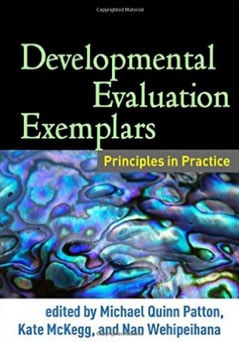If you are serious about tackling complex issues and changing systems in an ever-changing world, then you should be serious about Developmental Evaluation (DE). Michael Quinn Patton popularized the approach in his groundbreaking 2010 book, Developmental Evaluation: Applying Complexity Concepts to Enhance Innovation and Use. In it, he provided a comprehensive account of how evaluative thinking and practices could assist - rather than short circuit - the efforts of social innovators.
 Since then, DE has become wildly popular. A search of DE generates nearly 6 million entries on Google, it is one of the most popular themes at the American Evaluation Association conference, and there are thousands of would-be changemakers and evaluators who claim to be "doing" Developmental Evaluation.
Since then, DE has become wildly popular. A search of DE generates nearly 6 million entries on Google, it is one of the most popular themes at the American Evaluation Association conference, and there are thousands of would-be changemakers and evaluators who claim to be "doing" Developmental Evaluation.
Patton has now teamed up with two experienced evaluators from New Zealand,Kate McKegg and Nan Wehipeihana, to explore how others have applied DE concepts in practice and to develop an upgraded account of the approach. Their findings are remarkable.
In the opening chapter, Patton reviews the foundational concepts of DE, which he organizes as responses to ten common questions. He reconfirms some of the points made in the original book (e.g. that methods in DE must be adapted for each evaluation, how DE is distinct from approaches such as action-research). He also expands upon and refines some of his original thinking, such as the skills required by would-be Developmental Evaluators and how to balance DE and the need for accountability. This chapter alone is worth the price of the book.
But it gets better. Each of the next twelve chapters describe a developmental evaluation "exemplar" prepared by their evaluators and innovators. They cover a variety of domains (i.e. education, youth homelessness, sport, poverty, science, arts, health, reconciliation and agriculture) and scales (e.g. neighbourhood, city-wide, regional, national and international). The diversity of their experiences, coupled with the honest manner with which many of the authors relate the challenges they encountered in their assessments, means the book contains the best collection of DE cases to be found outside of Patton's original work.
In the second last chapter, McKegg and Wehipeihanas help make sense of it all. They provide a solid synthesis of common and divergent themes across the examples, draw some conclusions about the state of DE practice and surface new questions for evaluators and innovators to wrestle with in the next cycle of DE development.
In the final chapter, Patton describes eight principles to guide evaluators and innovators in the craft of quality evaluations, with the reminder that principles provide direction, but must be interpreted and adapted to the unavoidably unique context in which each innovation and evaluation unfolds. They include such things as the importance of employing a complexity lens in DE to get a more rounded picture and the necessity of real time evaluative feedback to ensure that they keep pace with the unfolding intervention. The principles are clear and practical and help create an even clearer framework for DE practice.
A mere five years ago, DE was a set of novel ideas and emerging practices embraced by a small number of pioneers. Today, Developmental Evaluation Exemplars confirms that there is now a pattern of DE principles and practices ready to be embraced by a larger pool of early adopters. Thank you Michael, Kate and Nan.
Register for Developmental Evaluation: Principles in Practice, an upcoming webinar with Michael Quinn Patton and Mark Cabaj.
Learn More:
- Register for Developmental Evaluation: Principles in Practice, an upcoming webinar with Michael Quinn Patton and Mark Cabaj
- Order the Book
- Visit BetterEvaluation's Developmental Evaluation webpage for resources and a summary of DE
- Listen to the Developmental Evaluation podcast and access additional resources





